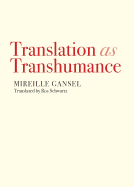
French translator Mireille Gansel won the 2016 French Voices Award and the 2017 English PEN Translation Award for this elegant, extended essay that muses on humanistic approaches to translation. Her reflections are based on her personal and professional experience. As survivors of the Jewish internment camps of World War II, Gansel's family avoided speaking German--it represented the "barbed-wire fences and watchtowers of history." As an adult, Gansel learned to appreciate the underlying beauty and lyricism of her family's native tongue through the happy prewar memories of an aunt.
Gansel discovered that intimate involvement--living, breathing and talking poetry with the people creating it--in the process of translation provided "the clay from which I could fashion my own interior language." While studying and working with poet and translator Reiner Kunze, Gansel learned how exile affected the language of expression. This played a role in how she interpreted the works of Nelly Sachs, a German Jewish exile whose experience of Nazism provoked her to write eloquently of the pain and suffering of the Jewish people. While using an ethnologist's approach in translating the poetry of the mountain people of Vietnam, Gansel gained a deeper emotional understanding of the language's musicality of expression, absorbing its rhythms, cadences and registers.
In applying such humanistic approaches, Gansel found that translation transcends language to offer universalities of meaning. And Ros Schwartz's English translation of Gansel serves to bear out the poet's (or in this case, the translator's) vision: "I was the one who had everything to learn, everything to understand, from the other." --Nancy Powell, freelance writer and technical consultant

